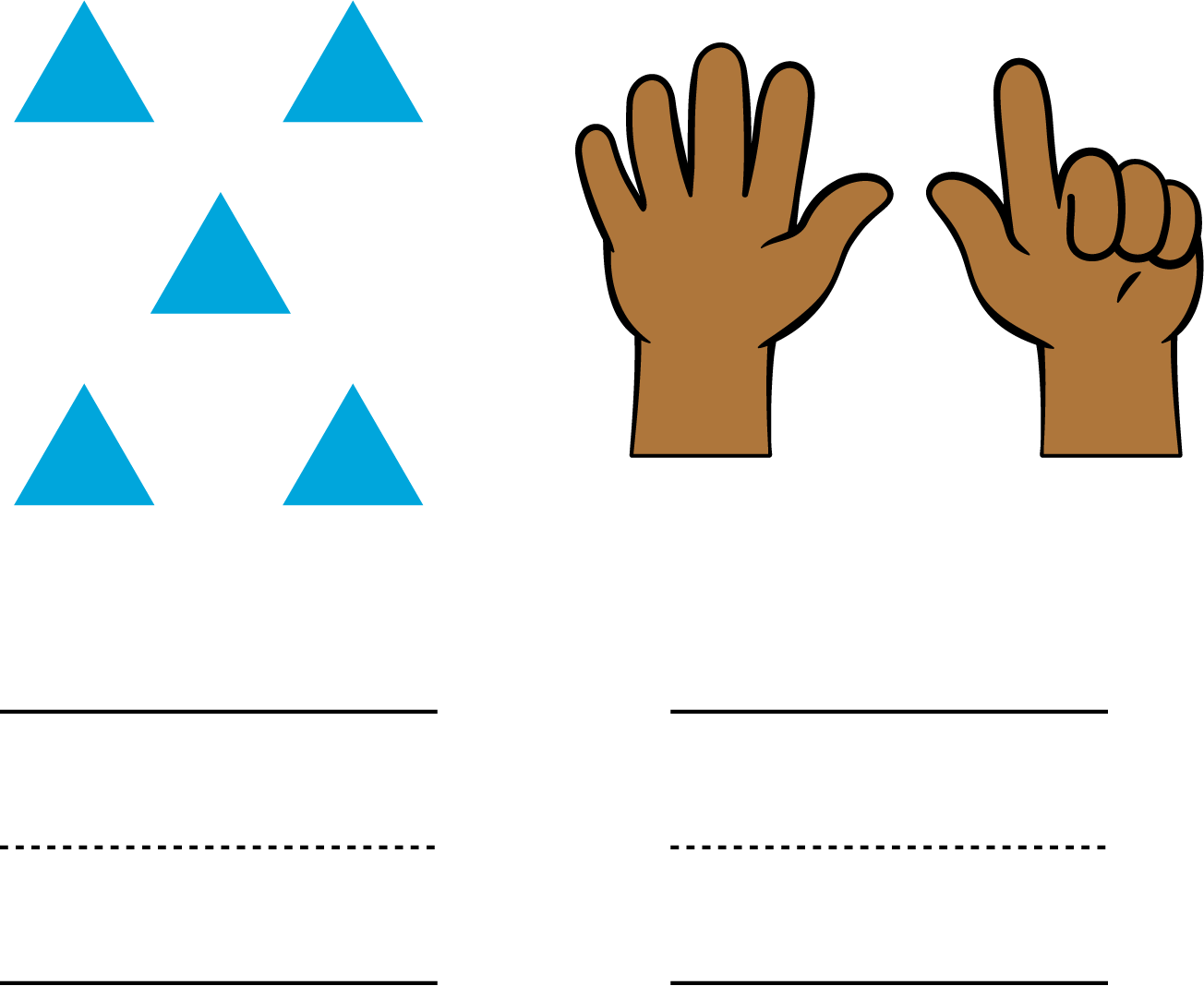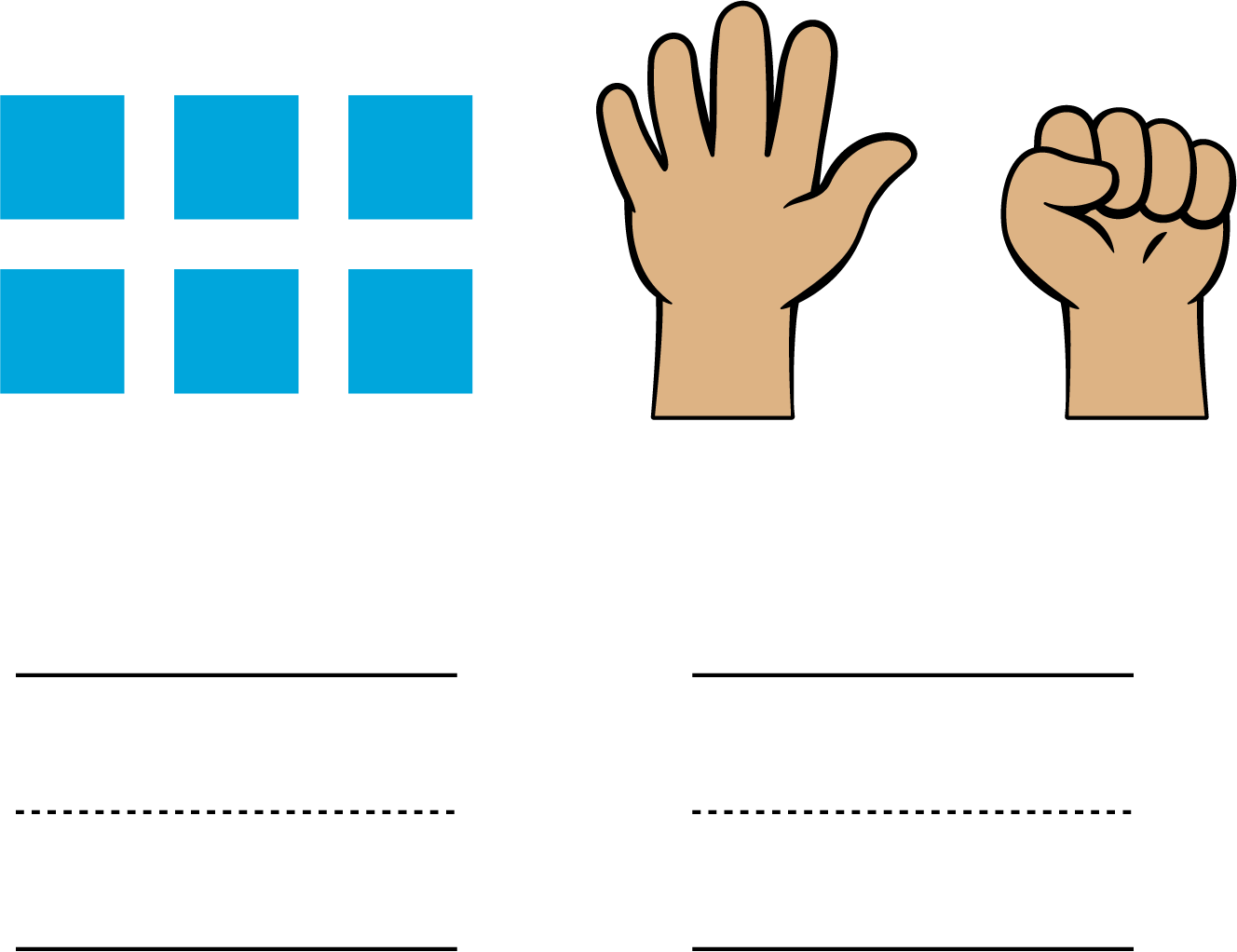Lesson 19
Compare Numbers and Images
Warm-up: Act It Out: Pass Out Snacks (10 minutes)
Narrative
The purpose of this warm-up is to allow students to connect language to mathematical representation, which will be useful when students interpret and create representations of quantities in order to identify one more or one less.
This warm-up gives students opportunities to make sense of a problem by acting it out first before thinking about how to solve the problem (MP1).
Launch
- Groups of 2
- Display and read the story.
- “What is the story about?”
- 30 seconds: quiet think time
- Share responses.
- Read the story again.
- “How can you act out this story?”
- 30 seconds: quiet think time
Activity
- “Discuss your thinking with your partner.”
- 1 minute: partner discussion
- Share responses.
- Choose a way to represent the story as a class.
- Read the story together.
Student Facing
Diego is passing out snacks to the students at his table.
He has 5 apples.
His teacher gives him 1 more apple.
How many apples does Diego have now?
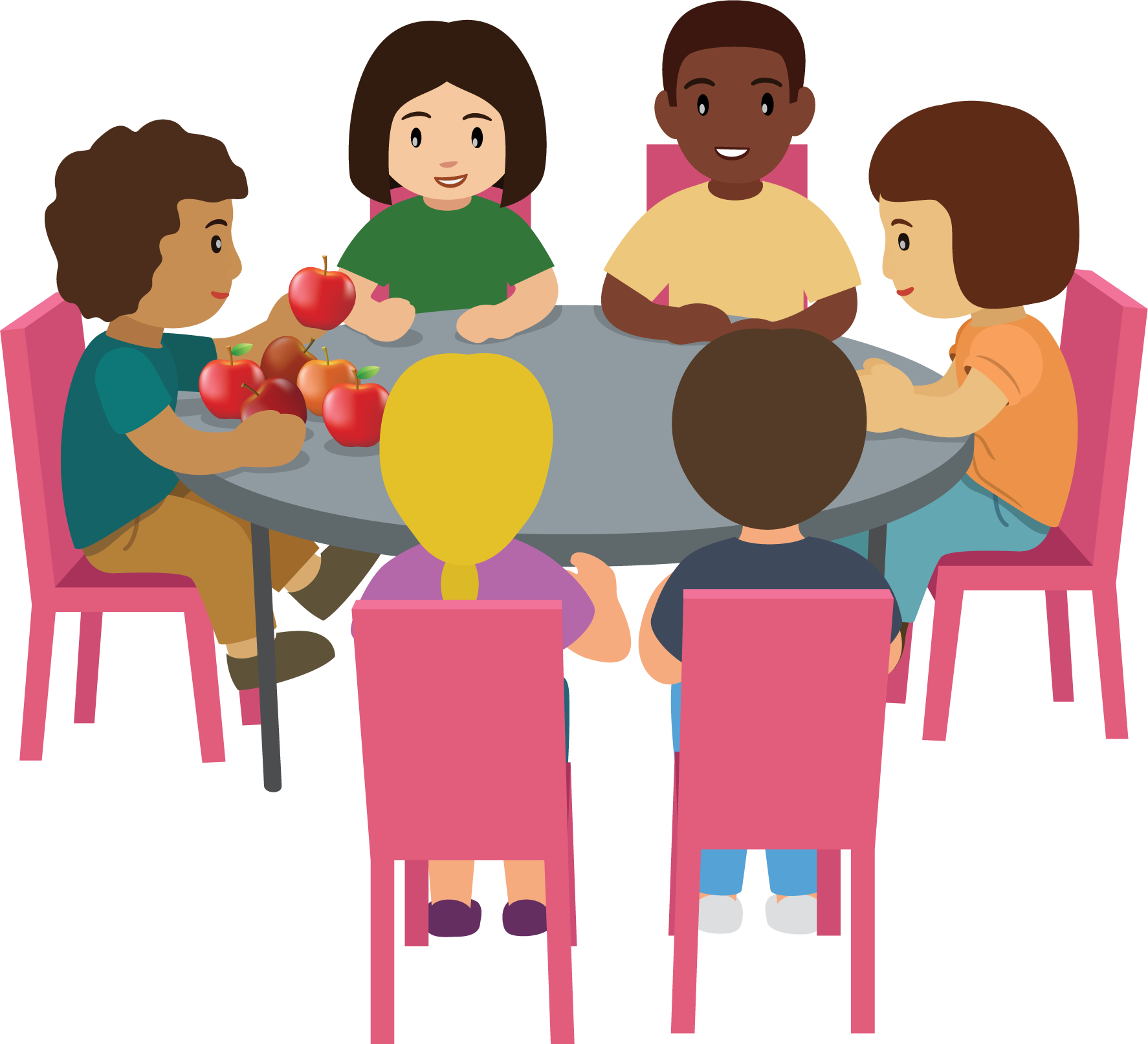
Student Response
For access, consult one of our IM Certified Partners.
Activity Synthesis
- “What number is one more than 5? How do you know?” (6. I counted the pictures we drew. I know that 6 comes after 5 when we count.)
Activity 1: Which Has More? (10 minutes)
Narrative
The purpose of this activity is for students to compare images and numbers. Students count the number of images and write the number. In order to compare the groups, students may use the images or the numbers. In the synthesis, students discuss both of these strategies.
Supports accessibility for: Social-Emotional Skills, Attention
Launch
- Groups of 2
- “Figure out how many things there are in each group. Write the number. Then circle the group that has more.”
Activity
- 5 minutes: partner work time
- Monitor for students who use the images to compare and other students who use the numbers to compare.
Student Facing
Student Response
For access, consult one of our IM Certified Partners.
Activity Synthesis
- Display the second problem.
- Invite previously selected students to share how they used the images to compare.
- Invite previously selected students to share how they used the numbers to compare.
Activity 2: Introduce Less, Same, More, Numbers and Images (15 minutes)
Narrative
The purpose of this activity is for students to learn stage 4 of the Less, Same, More center. Students use cards that show the written number as well as a group of images representing the number. Students determine if the number on each card is less than, the same as, or more than the given number. During the synthesis, students discuss how the structure of the counting sequence helps us compare numbers (MP7).
Advances: Conversing
Required Materials
Materials to Copy
- Less, Same, More Mat
- Number and Image Cards
Required Preparation
Launch
- Groups of 2
- Give students the mats and cards.
- “We are going to learn a new way to do the Less, Same, More center.”
- “First, draw a card and place it at the top of the mat. That card will stay there for the whole round.”
- “As you flip over each other card, decide if it shows, less than, the same number as, or more than the card at the top. If it shows less than, put it in the square on the left. If it shows the same number as, put it in the square in the middle, and if it shows more than, put it in the square on the right.”
- “After you place each card, tell your partner a sentence using the words ‘less than’, ‘the same as’, or ‘more than’.”
- Demonstrate one round.
Activity
- 10 minutes: partner work time
Activity Synthesis
- Display a mat with the 7 card at the top.
- “What numbers are less than 7? How do you know?” (1, 2, 3, 4, 5, 6 because when you count all of those numbers come before 7 so they are less than 7.)
- “What numbers are more than 7?” (8, 9, 10)
Activity 3: Centers: Choice Time (20 minutes)
Narrative
The purpose of this activity is for students to choose activities that offer practice with number and counting concepts
- Less, Same, More
- Math Libs
- Number Race
Required Materials
Materials to Gather
Required Preparation
- Gather materials from:
- Less, Same, More, Stages 1-4
- Math Libs, Stage 1
- Number Race, Stage 1
Launch
- “Today we are going to choose from centers we have already learned. One of the choices is to continue playing Less, Same, More.”
- Display the center choices in the student book.
- “Think about what you would like to do first.”
- 30 seconds: quiet think time
Activity
- Invite students to work at the center of their choice.
- 8 minutes: center work time
- “Choose what you would like to do next.”
- 8 minutes: center work time
Student Facing
Choose a center.
Less, Same, More

Math Libs
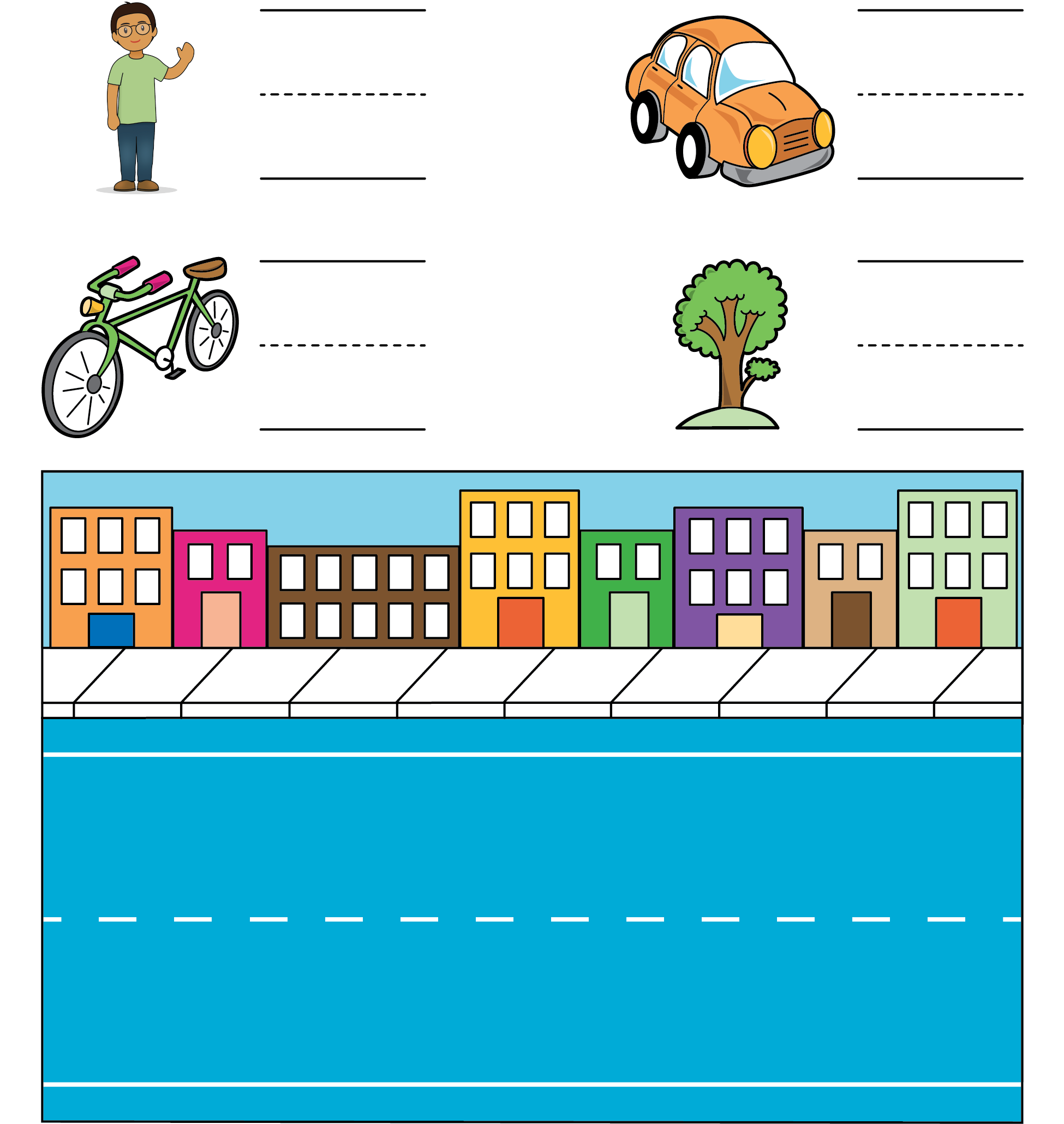
Number Race
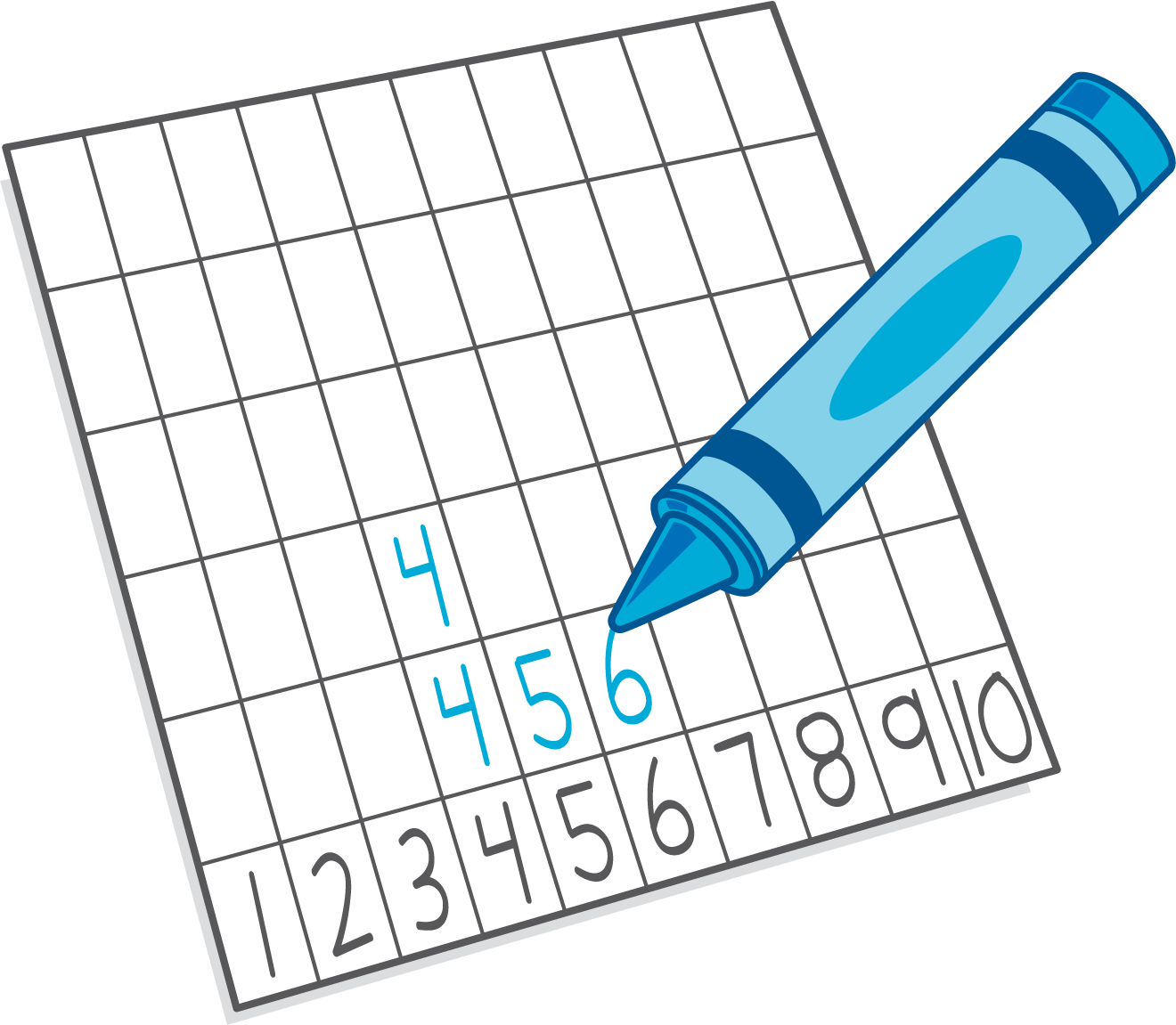
Activity Synthesis
- “Which materials do you need if you want to play Less, Same, More? Where can you find the materials in our classroom?”
Lesson Synthesis
Lesson Synthesis
Display 7 images with the number 7 underneath. Display the number 5.
“How can we figure out which is more?” (We can draw 5 things and figure out if there are more. I know that 7 is more than 5 because when we count, 7 comes after 5.)
Cool-down: Unit 2, Section C Checkpoint (0 minutes)
Cool-Down
For access, consult one of our IM Certified Partners.

